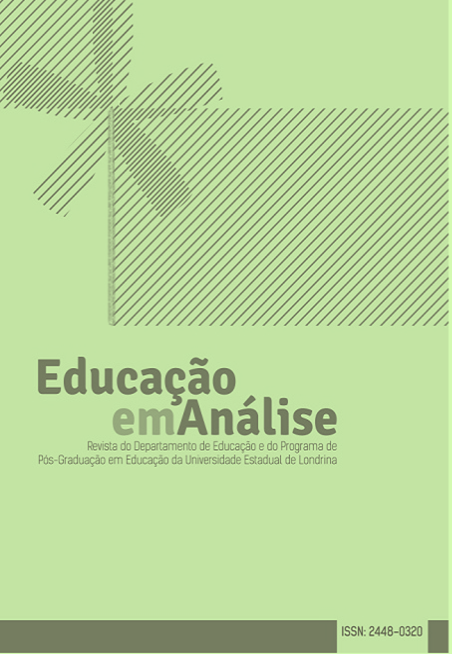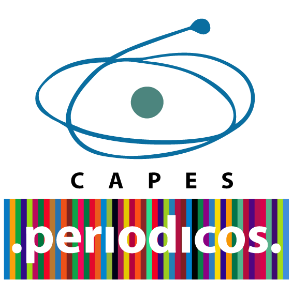Potent bodies that see, freak bodies that are seen: analysis on a non-binary and modified body
DOI:
https://doi.org/10.5433/1984-7939.2021v6n1p9Keywords:
Schizoanalysis, Gender studies, Queer theoryAbstract
The present article invests in the analysis of an interview conducted in the year 2014 (during the interviewer's doctoral research) and analyzed and written together with the interviewee in 2019 (after six years). In the polyphonic process the experience of Thi Angel's own body was highlighted, Thi Angel, performer art, history teacher of a peripheral public school in Osasco-SP, who in the last two decades researches about body modification (bodymodification) and the different uses of the body. Thi Angel points out how the trajectory of his body modifications went along with his activism for sexual and reproductive rights, human and animal rights, his connection with veganism and performance art. During the first interview, Thi Angel narrates her stylistic existence and the writings and marks built on her body through performance art, as well as brings the difficulties of low vision due to the disease Keratoconus, since the age of 14, and the emergence of transplants in both eyes. Already in 2019, the reunion for this polyphonic writing recalls and announces the occurrences experienced after 6 years. The cartographic positioning was the support and connection with the world to carry out the analyses of the events and the interviews that were audiotaped and transcribed in full. For the elaboration of such analyses we resorted to the theoreticalmethodological epistemes of the Philosophy of Difference, Queer Theory, Crip Theory, and Gender Studies.
Downloads
References
ANGEL, T. Manisfesto Freak. FRRRKguys. [S. l.], 6 jan. 2016. Disponível em: http://www.frrrkguys.com.br/manifesto-freak/. Acesso em: 12 dez. 2019.
BRAIDOTTI, R. Sujetos nómades. Buenos Aires: Paidós, 2000.
BUTLER, J. Problemas de gênero: feminismo e subversão da identidade. Tradução Renato Aguiar. Rio de Janeiro: Civilização Brasileira, 2003.
BUTLER, J. Deshacer el genero. Barcelona: Paidos, 2004.
BUTLER, J. Cuerpos que importan: sobre los límites materiales y discusivos del "sexo". 2. ed. Buenos Aires: Paidós, 2008.
DELEUZE, Gilles. "Uma conversa, o que é, para que serve?" In: DELEUZE, Gilles; PARNET, Claire. Diálogos. São Paulo: Escuta, 1998.
DELEUZE, G.; PARNET, C. Diálogos. Tradução Eloisa Araújo Ribeiro. São Paulo: Escuta, 1998.
FOUCAULT, M. A vida dos homens infames. In: FOUCAULT, M. Estratégia, poder-saber. Tradução Vera Lucia Avellar Ribeiro. Rio de Janeiro: Forense Universitária, 2003a. p. 203-222. (Ditos e escritos, v. 4).
FOUCAULT, M. Diálogo sobre o poder. In: FOUCAULT, M. Estratégia, poder-saber. Tradução Vera Lucia Avellar Ribeiro. Rio de Janeiro: Forense Universitária, 2003b. p. 253-266. (Ditos e escritos, v. 4).
FOUCAULT, M. Poder-Corpo. In: FOUCAULT, M. Microfísica do poder. Tradução Roberto Machado. 18. ed. Rio de Janeiro: Graal, 2003c. cap. 9, p. 145-152.
FOUCAULT, M. História da sexualidade 1: a vontade de saber. Tradução Maria Thereza da Costa Albuquerque e J. A. Guilhon Albuquerque. 16. ed. Rio de Janeiro: Graal, 2005.
FOUCAULT, M. A ordem do discurso. 14. ed. São Paulo: Ed. Loyola, 2006.
HALL, S. Quem precisa da identidade?. In: SILVA, T. T. (org.). Identidade e diferença: a perspectiva dos estudos culturais. 2. ed. Petrópolis: Vozes, 2003. p. 103-133.
LE BRETON, D. Adeus ao corpo: antropologia e sociedade. Tradução Marina Appenzeller. Campinas: Papirus, 2003.
MELLO, A. G. Deficiência, incapacidade e vulnerabilidade: do capacitismo ou a preeminência capacitista e biomédica do Comitê de Ética em Pesquisa da UFSC. Ciências e Saúde Coletiva, Rio de Janeiro, v. 21, n.10, p. 3265-3276, 2016.
MELLO, A. G.; NUERNBERG, A. H. Gênero e deficiência: interseções e perspectivas. Revista Estudos Feministas, Florianópolis, v. 20, n. 3, p. 635-655, dez. 2012. Disponível em: http://www.scielo.br/scielo.php?script=sci_arttext&pid=S0104026X2012000300003 &lng=en&nrm=iso. Acesso em: 12 dez. 2019.
NASCIMENTO, M. A. N. Corpos (con)sentidos: cartografando processos de subjetivação de produto(re)s de corporalidades singulares. 2015. 265f. Tese (Doutorado em Psicologia). - Faculdade de Ciências e Letras, Universidade Estadual Paulista, Assis, 2015.
NOGUEIRA, C. Interseccionalidade e psicologia feminista. Salvador: Devires, 2017.
SCOTT, J. W. Experiência. In: SILVA, A. L.; LAGO, M. C. S.; RAMOS, T. R. O. (org.). Falas de gênero: teorias, análises, leituras. Florianópolis: Mulheres, 1999. p. 21-55.
SPIVAK, G. C. Pode o subalterno falar?. Tradução Sandra R. G. Almeida, Marcos P. Feitosa e André P. Feitosa. Belo Horizonte: UFMG, 2012.
TEDESCO, S. H.; SADE, C.; CALIMAN, L. V. A entrevista na pesquisa cartográfica: a experiência do dizer. Fractal: Revista de Psicologia, [S. l.], v. 25, n. 2, p. 299-322, aug. 2013. Disponível em: http://periodicos.uff.br/fractal/article/view/4944. Acesso em: 1 fev. 2020.
Downloads
Published
How to Cite
Issue
Section
License
Copyright (c) 2021 Educação em Análise

This work is licensed under a Creative Commons Attribution 4.0 International License.
Os artigos publicados na Revista Educação em Análise estão sob a Licença Creative Commons Atribuição 4.0 Internacional, garantindo Acesso Aberto. Deste modo, os autores mantêm os direitos autorais de seus trabalhos e, em caso de republicação, solicita-se que indiquem a primeira publicação nesta revista. Essa licença permite que qualquer pessoa leia, baixe, copie e compartilhe o conteúdo, desde que a devida citação seja feita. Além disso, autoriza a redistribuição, adaptação e criação de obras derivadas em qualquer formato ou meio, incluindo uso comercial, desde que a atribuição à revista seja mantida.
A revista se reserva o direito de efetuar, nos originais, alterações de ordem normativa, ortográfica e gramatical, com vistas a manter o padrão culto da língua e a credibilidade do veículo. Respeitará, no entanto, o estilo de escrever dos autores. Alterações, correções ou sugestões de ordem conceitual serão encaminhadas aos autores, quando necessário.
As opiniões emitidas pelos autores dos artigos são de sua exclusiva responsabilidade.
























